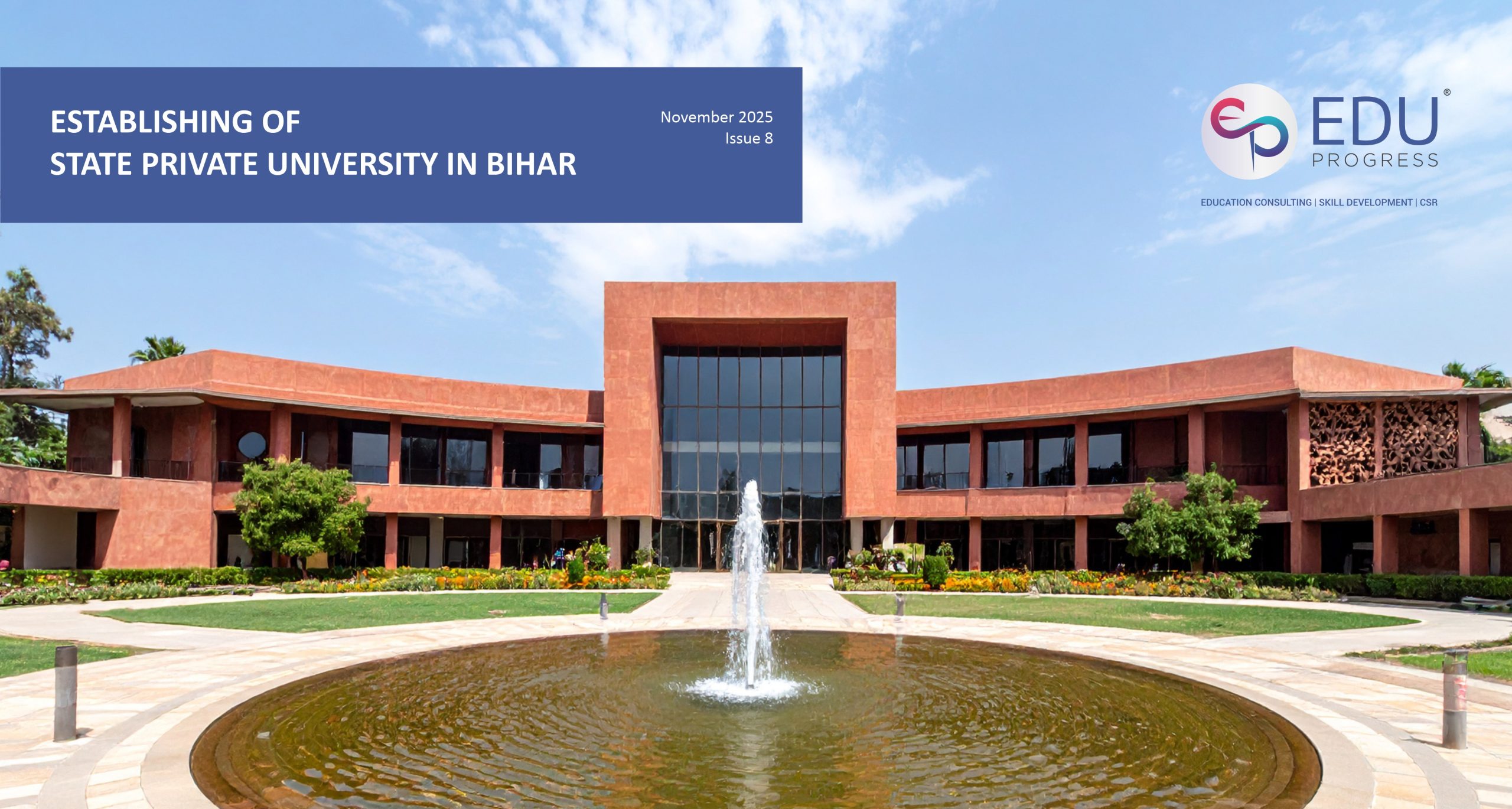
1. REGULATORY FRAMEWORK OF HIGHER EDUCATION IN INDIA
India’s higher education has diversified significantly with private institutions. In recent years over 517 private universities have been established nationwide (as of 2025), reflecting their growing role in meeting demand. Private universities often focus on specialized or professional programs, complementing public institutions. At the national level the University Grants Commission (UGC) is the apex statutory body (under the UGC Act 1956) responsible for coordinating, promoting and maintaining standards of university education. The UGC publishes regulations and norms on infrastructure, faculty qualifications, curricula, fee structures, etc., which private universities must follow. State higher education councils (e.g. the recently formed Bihar State Higher Education Council) advise state governments on coordination and planning, though actual regulation of universities (public or private) is largely through state legislation and the UGC.
Private Universities in India
These are universities established by private sponsoring bodies (usually educational trusts or societies) through state legislative acts. They are fully self-financed and cannot affiliate external colleges; they grant degrees under the state’s act and UGC recognition. Private universities have greatly expanded access (e.g. niche programs in technology, management, or vocational fields) to serve India’s large student population. They often emphasize employability and industry linkages to attract students, given their reliance on tuition and reputation.
UGC and other bodies
All universities (state, central, private) must be recognized by the UGC and adhere to its academic standards. Professional programs also face multiple regulators (AICTE for engineering, NCTE for teacher education, etc.), so a private university must obtain approvals or exemptions from these bodies. In practice, private universities need to comply with UGC’s “Minimum Standards of Instruction” and other UGC Regulations (e.g. 2020 regulations on private univs), which specify requirements on faculty, fees, student amenities and more. State education departments or councils may also set policies on issues like reservations in admissions, which private universities must follow (as will be noted for Bihar).
2. HIGHER EDUCATION LANDSCAPE AND DEMAND IN BIHAR
Bihar has a young and growing population with increasing demand for higher education, but its public capacity is limited. Bihar is home to 8 Institutes of National Importance, 4 central universities, 21 state universities, 1 Deemed to be University and only 7 private universities. Literacy and school completion rates in Bihar have been improving, so the pool of eligible students is growing. However, the state suffers from limited seats in quality colleges and intense competition.
08
Institutes of National Importance
04
Central Universities
21
State Universities
01
Deemed to be University
07
Private Universities
3. KEY CONSIDERATIONS FOR ESTABLISHING A PRIVATE UNIVERSITY IN BIHAR
Establishing a private university involves careful planning of legal, financial and academic steps under the Bihar Act. The Bihar Private Universities Act, 2013 (Bihar Act 20 of 2013) is the governing law; it, with its 2017 and 2022 amendments, lays down the requirements and process for new private universities. Key provisions include: owning requisite land, setting up an endowment fund, building infrastructure, and financial/faculty commitments. Post-enactment, the process is sequential: proposal → Letter of Intent → compliance → final notification. Several practical challenges (land acquisition, funding, staffing, etc.) must be addressed, but solutions exist (see below).
3.1 Bihar Private Universities Act, 2013 (with Amendments)
The Bihar Act provides a comprehensive framework. Major points:
Purpose and Scope
The Act’s preamble states its intent “to provide for establishment and incorporation of Private Universities in Bihar for imparting higher education”. It applies statewide and defines a private university as one established by a registered trust or society. A sponsoring body (society/trust) must be financially sound and experienced in education.
Compliance Report and Letter of Intent (LOI)
Section 4 of the Act requires a sponsoring body to submit a detailed proposal and project report to the State Government. This report must cover the sponsor’s credentials, financial resources, planned land/site, proposed courses and phased development plans. The state forms an expert committee (including a VC, a senior professor, and a finance member) to evaluate the proposal on technical and financial grounds. If favorable, the Government issues a Letter of Intent (LOI) under Section 5(1), specifying conditions the sponsor must fulfill.
Land Requirement
The Act mandates a minimum campus size. Specifically, the sponsoring body must own at least 10 acres of contiguous land outside a municipal limit or 5 acres within a municipality. This is reiterated in Section 5 conditions. The land must be free from legal disputes and suitable for campus development. (The 2017 amendment did not change this base requirement, but did provide flexibility on timing – see below.)
Infrastructure Commitments
Under the LOI (Sec 5) the sponsor is asked to construct at least 10,000 square meters of covered building area before the university starts operations. It must also invest in a library (minimum Rs 10 lakh initial purchase and Rs 50 lakh over 3 years) and equip laboratories, computers, furniture etc. (Rs 20 lakh initial, plus Rs 1 crore over 5 years). These figures ensure a functional campus from Day 1.
Endowment Fund
Section 11 requires the sponsoring body to create a minimum Endowment Fund of Rs 1 crore. This fund is held in long-term government securities or a Treasury deposit as security against non-compliance. Its corpus can be used for capital development of the university, but not for routine salaries or expenses. The State Government has power to forfeit (fully or partly) this fund if the university violates the Act or its own statutes. The endowment protects students’ interests by providing a financial deterrent against mismanagement.
Governance and Self-Financing
The Act designates the state’s Governor as the Visitor. The Chancellor (head of the university) is appointed by the sponsoring body (with state approval), and the Vice-Chancellor is appointed by the Chancellor from a nominated panel. It also provides for a statutory Governing Body and Academic Council with sponsors’ nominees, teachers and experts. Importantly, Section 8 mandates that the university must be entirely self-financed and cannot receive government grants. All funding must come from tuition, endowment, donations, or research contracts.
Amendments (2017 & 2022)
The Act has been amended twice to ease compliance. The 2017 Amendment (Bihar Act 9 of 2017) inserted provisos to Section 5(1): it allowed the sponsor to commence classes in a temporary/leased building of at least 5000 sqm while permanent construction continued, and allowed the state to extend the compliance period (to meet land, building, etc.) by up to 2 years. More recently the 2021 Amendment (enacted 2022) went further: it removed the 2-year cap on extension. Now the state government may extend the compliance deadline “for such period as may be deemed fit” if the sponsor has shown valid reasons. These amendments recognize practical delays (e.g. land acquisition, construction) and give sponsors more flexibility to fulfill the LOI conditions.
Other Provisions
The Act also includes familiar requirements such as adherence to state reservation policies in admissions and staffing, prohibition on affiliating external colleges (the university can only have its own constituent schools), and creation of a Provident Fund and welfare schemes for employees. It empowers the state to inspect the university and even dissolve it if it grossly violates norms.
3.2 Steps for Establishing a Private University in Bihar
The process flow, as per the Act and government practice, is as follows:
1. Preparation and Submission of Proposal:
The sponsoring body prepares a Detailed Project Report (DPR) containing details of its background, finances, proposed campus location, academic plans and feasibility study. An application with this report and a prescribed fee is submitted to the Bihar Education Department.
2. Expert Committee Review:
The State Government constitutes a multi-disciplinary committee (typically a Vice-Chancellor, an education expert, and a finance expert) to scrutinize the proposal’s merits. The committee assesses financial soundness, sponsor’s experience, and alignment of proposed courses with state needs. It may seek additional clarifications from the sponsor if needed. A report is submitted, usually within one month.
3. Letter of Intent (LOI):
If the committee’s report is favorable, the state issues a Letter of Intent to the sponsor. This LOI explicitly lists the conditions to be met before the university can be notified. Key conditions include establishing the Endowment Fund (Rs 1 Cr), securing the required land (10/5 acres), constructing at least 10,000 m² of built-up area, and investing in books, equipment and faculty posts (as outlined above). The sponsor must give formal undertakings to meet all these conditions.
4. Compliance Period:
The sponsoring body then works to fulfill these requirements. Under the Act (before amendment) the maximum period to report compliance was two years; after amendments this period can be extended if justified. During this time the sponsor typically finalizes the land purchase, begins campus construction, establishes the endowment fund in government securities, purchases library resources, and hires core faculty.
5. Submission of Compliance Report:
Once conditions are satisfied, the sponsor submits a detailed compliance report to the State Government, certifying that all LOI conditions are met. The state verifies the report (officials or a committee may inspect the site). If deficiencies are found, further extensions or conditions may be imposed; if the sponsor fails to comply (and extensions are not granted), the LOI can be deemed withdrawn and the proposal rejected.
6. Notification of Establishment:
On satisfactory compliance, the Government issues a Gazette Notification under Section 6, officially establishing the university. This notification names the university, its location, and jurisdiction. The university then obtains a formal Certificate of Incorporation as a body corporate (Section 7). Thereafter it may begin admissions and operations in accordance with the Act and its statutes.
Throughout these steps, the sponsor must remain in close coordination with the Education Department, the UGC (which will later recognize the new university), and any other concerned agency (e.g. AICTE for engineering programs). The process is sequential and must be completed before the university can legally enroll students.
4. CASE STUDIES OF PRIVATE UNIVERSITIES IN BIHAR
Amity University, Patna
Part of the well-known Amity Education Group, Amity University Patna was established by Bihar Private Universities (Amendment) Bill, 2017. It offers a broad range of undergraduate and postgraduate programs (engineering, management, law, etc.) and benefits from Amity’s national brand and resources. As an early mover, it leveraged Amity’s placement network and franchises (such as the Amity Global Business School in Patna) to attract students. By emphasizing modern pedagogy and international collaborations, it has built trust among students and parents. Key success factors: strong brand reputation, diversified programs, and industry-oriented curriculum (backed by Amity’s established systems).

Sandip University, Madhubani
Founded by the Sandip Foundation, this university sits on a 125+ acre campus in rural Madhubani. It quickly developed modern infrastructure across six schools (Engineering, Computer Science, Management, Education, Agriculture, Library Science) and actively promoted a futuristic curriculum. In 2022 it became the first private university in Bihar to secure NAAC accreditation (Grade B++), underscoring its focus on quality. The university recruited experienced faculty and built partnerships with top companies (its campus displays logos of recruiters like TCS, Infosys, Mahindra, etc.). Key success factors: large land reserve enabling world-class campus, rapid pursuit of accreditation, and strong industry placement support. Sandip’s success shows how even in a remote district, a private university can thrive by investing in faculty quality and student outcomes.

(Other recent private universities in Bihar include Gopal Narayan Singh University (Rohtas), Dr. C.V. Raman University (Vaishali), K.K. University (Kishanganj) and specialized institutions like Al-Karim University (Katihar) and Mata Gujri University (Kishanganj). Each is backed by significant trusts/industry groups and has focused on specific disciplines, reinforcing the trend that strategic vision and resources are key to early success.)
5. SUMMARY AND RECOMMENDATIONS
Bihar’s regulatory framework now supports the growth of private universities, and the state’s demand for higher education is strong. Key takeaways: the Bihar Private Universities Act 2013 (amended 2017, 2022) defines clear requirements (land, endowment, infrastructure, faculty) for new universities. Recent amendments have built in flexibility (e.g. extended compliance timelines) to address practical delays. Establishing a university is a multi-year project requiring detailed DPRs, coordination with regulators, and robust funding strategies.
Given Bihar’s low GER (~16%), new universities stand to serve a large student base, especially if they align offerings with state needs (engineering, agriculture, management, teacher training, etc.). However, sponsors should plan carefully to overcome challenges of land, finance and staffing. Recommendations include:
Rigorous Project Planning
Develop a comprehensive business plan and DPR covering all statutory requirements. Use the state’s amendments to negotiate reasonable timelines. Employ consultants or legal advisors to ensure no regulatory step is missed.
Secure Resources Early
Arrange land and finances before applying. Establish the Rs 1 Cr endowment fund immediately after LOI. Phase campus construction to allow earlier student intakes.
Focus on Quality
Aim for early accreditation (NAAC) by building a qualified faculty and up-to-date curriculum (as Sandip did). Quality will drive demand.
Industry and Community Engagement
Create industry tie-ups to guarantee placements and internships. Engage local schools and communities to build a student pipeline. Emphasize unique strengths (e.g. brand name like Amity, or specialized programs in cutting-edge fields).
Governance and Compliance
Set up a strong governing board and administrative team that can handle statutory obligations (accounts, audits, and liaison with UGC and Bihar education authorities). Keep transparent records to build the university’s credibility and ease future inspections.
Government Liaison
Maintain regular contact with the Bihar Higher Education Department and UGC. Leverage any state incentives or initiatives (like land allotment policy or funding schemes).
Sustainable Operations
Since private universities are self-financed, plan for long-term sustainability through diversified programs, executive education, and alumni networks.
In conclusion, Bihar’s education landscape is ready for expansion, and the legal framework (with its recent amendments) is aligned to support private investment in higher education. By following the prescribed process, meeting key requirements, and focusing on quality and relevance, an aspiring sponsor can successfully establish a private university in Bihar. The experiences of Amity Patna and Sandip Sijoul show that institutional vision, coupled with compliance and community outreach, can yield a thriving university.
Strategic Consultancy for University Establishment
Eduprogress and Research Pvt. Ltd. is a premier project management consultancy with a dedicated focus on education and research. Our extensive range of expertise includes Education Consulting, Skill Development, Professional Training, and CSR Advisory. We deliver a comprehensive array of services designed to address all aspects of educational project development, including crafting Detailed Project Reports (DPR), formulating Strategic Plans, managing International Partnerships and Relationships, implementing the National Education Policy 2020, navigating Accreditation and Ranking processes, and executing Outreach, Marketing, and Branding strategies for Admissions. Additionally, we handle Statutory and Regulatory Compliance, Human Resource Management, Fundraising Research, Strategy and Implementation, and Alumni Development.
Our integrated approach ensures meticulous support throughout the entire project life cycle—from initial conceptualization and planning to final execution, monitoring, and evaluation. We excel in assisting both public and private entities in achieving their educational goals. This knowledge paper underscores our unwavering commitment to transforming education through innovative strategies, designed to empower institutions to realize their full growth potential in today’s competitive landscape.
If you are aiming to establish a state-private university in Bihar, Eduprogress offers tailored consultancy services and will guide you through every step of the process, ensuring successful establishment and sustainable growth. You may please queries at info@eduprogress.co.in.
